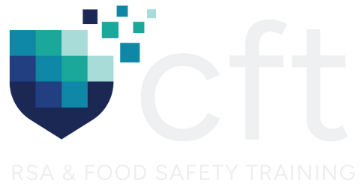Food Safety Legislation and Regulation in Queensland
The Food Act 2006 (the Act) is the main food safety legislation in Queensland and applies to all Queensland food businesses. The objectives of the Act are to:
- ensure food for sale is safe and suitable for human consumption
- to prevent misleading conduct in relation to the sale of food
- to apply the Australia New Zealand Food Standards Code.
The Act manages food safety according to the level of risk that the food business presents to the community. The higher the level of risk, the higher the level of food safety regulation.
Food businesses in Queensland must be registered with their local council.
Every licensed food business must have a food safety supervisor to ensure food is being handled safely.
A food safety supervisor is a person who has advanced food safety skills and knowledge and must have the authority to supervise and give directions about matters relating to food safety to people who handle food in a food business. Their role is to make sure the business is handling food safely.
Food Safety Queensland Explained
Who Can be a Food Safety Supervisor?
A Food Safety Supervisor must be a person who is reasonably available to advise and supervise each food handler at a food business on a day-to-day basis. There may be more than one food safety supervisor for each food business.
Responsibilities
A Food Safety Supervisor must:
- know how to recognise potential food safety hazards of the business and ensure the risks are prevented or managed
- have skills and knowledge of food safety matters that are relevant to the business and share skills and knowledge to improve awareness of foodborne illness
- have the authority to supervise and give directions about food safety matters to other food handlers at the business
- help foster a positive food safety culture, where food safety is a top priority
- be reasonably available to be contacted while the food business is operating by
- any food handler at the food business
- the local government that licensed the food business.
What is 'reasonably available'?
The Food Act 2006 requires a Food Safety Supervisor to be ‘reasonably available’ to be contacted by Food Handlers at the food business and by the local government. ‘Reasonably available’ generally means that the Food Safety Supervisor physically works on-site and oversees the day-to-day food handling operations of the food business.
A Food Safety Supervisor should be located on the premises whenever food handling of high-risk unpackaged foods is being undertaken or should be able to be easily contacted (for example, by phone) if established food handling procedures are in place at the business.
If the Food Safety Supervisor is absent from a food business (for example, on a short holiday up to 30 days), there should be documented standard operating procedures (written procedures) to ensure directions about matters relating to food safety are available to those who handle food. For an extended leave of absence, another Food Safety Supervisor needs to be appointed.
A Food Safety Supervisor is not required to be available when the business is operating but no food handling is being undertaken. For example, if a sporting club kitchen closes at 9pm but the club remains open until 11pm for entertainment, a Food Safety Supervisor is not required after 9pm.
Training and Certification
Under the Food Standards Code, Standard 3.2.2A, Food Safety Management Tools, Food Safety Supervisors for category one and category two food businesses (excluding the handling of food for or at a fundraising event) must obtain a food safety supervisor certification at least every five years.
It is recommended that Food Safety Supervisors for all other licensed food businesses obtain the same certification to demonstrate that they have the required level of skills and knowledge to be a food safety supervisor.
The Food Safety Supervisors should be able to provide their certificate to an authorised officer, if requested.
A Food Safety Supervisors requires training based on the food sector that they are working in. Competency codes and titles are set by the National Quality Council and may change. If your food safety supervisor has a different competency code or title, contact your local government for advice.
How often is training required?
A food safety supervisor certificate is valid for five years for category one and category two food businesses. The certification will need to show that the participant has successfully completed the required units of competency.
A complete course will need to be repeated every five years for category one and category two food businesses. Alternatively, some RTOs may offer refresher food safety supervisor courses for those who have received the qualification previously.
Training for Specific Sectors
Training for the Food Processing Sector
Example food businesses in the food processing sector include:
- airline caterers
- wholesale bakers
- breweries
- canneries
- flour mills
- ice manufacturers
- packers
- pre-prepared meals
- wine productions.
The training competencies for Food Safety Supervisors in the food processing sector are:
| National competency code | Competency title |
|---|---|
| FBPFSY2002 | Apply food safety procedures |
| OR | |
| FBPFSY1002 | Follow work procedures to maintain food safety |
Training for the Retail and Hospitality Sector
Example food businesses in the retail and hospitality sector include:
- caterers for private functions
- convenience stores
- delicatessens
- grocers
- hotels
- retail market and stalls
- restaurants
- supermarkets
- takeaways and cafes.
The training competencies for food safety supervisors in the retail and hospitality sector are:
| National competency code | Competency title |
|---|---|
| SITXFSA005 | Use hygienic practices for food safety |
| SITXFSA006 | Participate in safe food handling practices |
| OR | |
| SIRRFSA001 | Handle food safely in a retail environment |
View CFT's Retail & Hospitality Industry Food Safety Courses
Training for the Health and Community Services sector
Example food businesses in the health and community services sector include:
- catering for hospitals and nursing homes
- childcare centres
- hospitals
- hostels
- meals on wheels
- nursing homes.
The training competencies for food safety supervisors in the health and community services sector are:
| National competency code | Competency title |
|---|---|
| HLTFSE001 | Follow basic food safety practices |
| HLTFSE007 | Oversee the day-to-day implementation of food safety in the workplace |
| HLTFSE005 | Apply and monitor food safety requirements |
View CFT's Retail & Hospitality Industry Food Safety Courses
Training for the Transport & Distribution Sector
Example food businesses in the transport and distribution sector include:
- bulk food distribution
- water carriers
- warehouse.
The training competencies for food safety supervisors in the transport and distribution sector are:
| National competency code | Competency title |
|---|---|
| SITXFSA005 | Use hygienic practices for food safety |
| SITXFSA006 | Participate in safe food handling practices |
How to find training courses
A Food Safety Supervisor Certificate for category one and category two food businesses must be obtained from a Registered Training Organisation (RTO).
A person who has a Statement of Attainment issued by an RTO for the national competencies identified above satisfies this requirement. Training is nationally recognised, so it does not matter where the RTO is located.
CFT International is nationally accredited to deliver this food safety training
Food businesses are encouraged to confirm that the chosen training provider is a current RTO and will provide a statement of attainment upon successful completion of the relevant competencies and display the nationally accredited logo..
There are other pieces of food safety legislation in Queensland that address food safety at a different level of the food supply chain:
- Food Regulation 2016 (the Food Regulation)—prescribes details in relation to licensable food businesses, display of licence details by mobile premises, isolation of contaminants in food and fees for applications.
- Food Production (Safety) Act 2000—regulates the production of primary produce for:
- egg and egg products
- dairy produce
- meat and meat products (including pet meat and rendered products)
- seafood
- horticulture (see sprouts)
- Food Production (Safety) Regulation 2014—sits under the Food Production (Safety) Act 2000 and sets out the Food Safety Schemes that business must implement.
Enforcement of the Act is a joint responsibility of Queensland Health and local government. Enforcement of the Food Production (Safety) Act 2000 in Queensland is the responsibility of Safe Food Production Queensland.
The Act does not apply to therapeutic products including dietary aids and supplements registered by the Therapeutic Goods Administration. To determine if a product is a food or a medicine, the Food-Medicine Interface Guidance Tool can be used.
Australia New Zealand Food Standards Code
All food businesses in Australia must comply with the Australia New Zealand Food Standards Code (the Food Standards Code). The Food Standards Code is a bi-national standard that is adopted by all Australian States and Territories (and New Zealand) into their own food legislation. It covers:
- standards for food safety and hygiene
- fit-out of food premises
- labelling, composition and advertising of food.
The Food Safety Standards are part of the Food Standards Code and apply across Australia. The standards reflect international best practice. They outline the obligations of food businesses in relation to:
- Food safety practices and general requirements (Standard 3.2.2)
- Food premises and equipment (Standard 3.2.3).
Enforcement of the Food Standards Code in Queensland is a joint responsibility of Queensland Health and Local Government.
For more information about the Food Standards Code:
- Keep up with code revisions and changes.
- Read more about the Food Safety Standards and Food Standards Code
- Read Safe Food Australia a guide that explains the Food Safety Standards which requires important practices to minimise food safety risks.
Is it a food or a medicine?
Generally a product that is swallowed will be either a food or a form of therapeutic good (a medicine). Often, claims made about a product or the appearance of the product may suggest that it is a therapeutic good. However, the fact that health claims are made about a product does not automatically make it a therapeutic good. Nor does the fact that the product comes in capsules or powders, or is labelled as a 'dietary supplement'.
The potential cross over between certain foods and medicines is referred to as the 'food-medicine interface' where regulators determine whether the Therapeutic Goods Act 1989 applies or state or territory food laws cover these products.
To determine if a product is a food or a medicine, the Food-Medicine Interface Guidance Tool (Opens in new window) can be used.
Other legislation, regulation and standards
- Therapeutic goods, including dietary aids and supplements, are regulated by the Therapeutic Goods Administration.
- Country of origin labelling is regulated by the ACCC.
- Health Star Rating is a voluntary scheme businesses can choose to add to their food labels.
- Weights and Measures - Trade measurement laws apply to all retail and wholesale transactions where measurement determines price. Further information can be found on the National Measurement Institute.
Share this story
Recent Blog Posts

Chat to one of our trainers
Our team are here to help with your questions

















